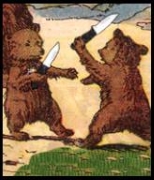|
P.d0t posted:Is this kind of ending/reboot ever a bad idea? and if so, why? What works in a book or movie can become tiresome in a game. I'll explain why I think so but I want to state outright that it could be totally awesome and great depending on the player. I'm forced to think in terms of Joe-Every-Man, though, because that's all I have to work with. First is the whole problem with 'it was all a dream' or whatever. After weeks or months or years of playing this game, learning none of it was real is a huge cop-out. "You have the option to stop this all from happening", while potent, robs the whole setting of its drama. None of the bad things that happened actually happened. None the character growth of the NPCs matter. None of the things risked, either short-or-long term during the course of play, actually mattered. Second is the problem of basically telling the PC that everything he did was wrong. All the choices he made resulted in the screwed up world they now live in. Being told, "choosing to die/walk away in the past makes all of this goes away" is a pretty big slap in the face. Philosophically it's fairly unsound too, since while you might guarantee X event does not occur, you also selfishly rob enumerable people of their growth and agency to stop some event. And you don't even have any assurance that something worse won't happen. It's hubris and a little too black-and-white for my taste. I like players to stew in the results of what they've wrought, and to feel victorious when they were victorious. Saying, "You win, but to really win you have to have not existed in the first place" is probably too harsh (to me) in an RPG.
|
|
|
|

|
| # ? Jun 11, 2024 14:11 |
|
A friend of mine was in a campaign once where the party eventually came across a gigantic magical mirror that they could use to travel back in time with. They used it to go back and re-do with foreknowledge a big story fight they cocked up months prior. It wasn't just a device to try and fix the PCs failing a mission either. They just came across a time machine and went about trying to abuse the poo poo out of it, dragging the thing everywhere they went. And that story got me thinking about setting up a campaign that from day one would eventually culminate with the players having having a time machine. The idea is that I would play the entire thing straight but keep excellent records so that when the day eventually comes when the party wields cosmic power they can hop back to anywhere previous and I've got everything ready to go. What would the players choose to with such a thing? Would they go back and correct their failings or would they manipulate the time line to position themselves as rules or would they run around scooping up story macguffins or what? Would they be irrevocably corrupted by such a thing? Maybe later a forgotten minor villain will use the thing without their knowledge and pull Biff Tannen up the story line. Who knows! I always thought it was a cool idea.
|
|
|
|
Mendrian posted:"You win, but to really win you have to have not existed in the first place" is probably too harsh (to me) in an RPG. You make some good points, but for context, I want to clarify a few things.
2. This leads to a whole bunch of "here's some stuff you did, and by that I mean NPC-you, whom you had no control over because that poo poo happened/was written by The DM before This Campaign happens"; to the point, it wouldn't really be "punishing the player for the choices he made" in the way you're describing 3. As I said off the hop, the "reboot" would be the player's choice, and would only be presented at a time when the campaign would be ending anyway; granted, it kinda gives one player the agency over all the others' destinies that they built through the course of the game, but I would probably allow them all to talk it out with him. They can try and influence his decision, but since the player sacrificed a lot by taking on this unusual responsibility, I would like to reward him for that effort, by letting him have the final say. I think I should add that part of the motif of the campaign is "poo poo happens" and "history repeats itself", so, yeah, maybe other bad things will happen instead; someone else will come along to kill off the establishment and throw the region into political instability. There will always be powergrabs and backstabbing. Or his family might get screwed up in other ways/for other reasons. What I want to do is present the player with the choice of "With the benefit of hindsight, do you want it to be you who does it? Or, if you could do it all over again, would sparing your family all this particular version of bullshit be more important to you?" I can see your point about it being "winning or really winning" but I'm trying not to make any judgments about any of my players' choices. Like, if the dude keeps history the way it currently is, then that is him making a conscious choice to bear the weight of his choices. You can cast it as "facing the truth" vs. "the easy way out", instead of just "the right ending and the wrong ending" I dunno, does that change your opinion of how I am coming at this?
|
|
|
|
Is this a setting with some sort of established time police; time deity; or fate-spinners? Now would be a good time to get involve, and have them work out what they want in a roleplay fashion. This way the choice is open and in their minds, and the narriative control is with the players.
|
|
|
|
TalonDemonKing posted:Is this a setting with some sort of established time police; time deity; or fate-spinners? Now would be a good time to get involve, and have them work out what they want in a roleplay fashion. This way the choice is open and in their minds, and the narriative control is with the players. It's a homebrewed setting running 4e D&D; there is not any time travel built-in. e: I suck at reading. P.d0t fucked around with this message at 20:10 on Mar 27, 2013 |
|
|
|
Alright, I'll try to get them onboard with at least one combat thing to start and kind of ease them in. I know how I can make it fit in. I'm planning on having some encounters ready for when they inevitably go on a goose chase of some kind, that's fine, but I'm really not looking to throw fights at them a lot so hopefully I won't have to use too many of them. I plan to do a lot of planning once I see where they go with my initial town place and see how they like to play the world. I guess I'll start screwing around with that soon. It'll probably be a bunch of non-complicated non-caster dudes for the warmup just so they can get used to how fights work and the relative power of things. I know 4e's skill system is kinda garbage. The idea that you just throw dice until you succeed/fail a certain number of times seems like an arbitrary simplification for the sake of not being very creative as a DM. I'm perfectly happy to have them derp around and investigate stuff and talk to people and have them drive all that, and sprinkle in a check here and there to see how it ends up turning out for them. I don't know that I can think of a way to design a skill challenge system like that that would succeed without you creating the framework for it to exist in anyways, so the fact that combat is pretty well crafted shores up the problems I was having in 3/3.5. I'm not too worried about power creep, if nothing else it'll change the setting a lot as levels happen and I won't be dealing with sociopaths. I have toyed with throwing in a henchmen of sorts mostly because I don't mind them having a mule for their stuff and also because it's possible we'll be playing on days where someone else might come over and it'd be nice for them to have something to take over that so they can participate without being that guy who only sometimes shows up. To that end, should I create him as a player choosable class npc template? It would simplify the process for someone who isn't always playing, and I really do NOT want a DM controlled character. Should his actions in combat be democratic or should he just be lazy and only participate in fights when there's someone extra? How much extra XP should I budget for that presence in an encounter? I suppose one other question is how feasible is it to lift an encounter out of an adventure as a basic template for one of the one-off fights they might wander into? Seems like it should be relatively easy to swap out the names of some skills and make it work.
|
|
|
|
Eldercain posted:I suppose one other question is how feasible is it to lift an encounter out of an adventure as a basic template for one of the one-off fights they might wander into? Seems like it should be relatively easy to swap out the names of some skills and make it work. Very easy. Make sure you add or delete enemies as appropriate. In general, subtract one normal enemy for every PC under the expected play level a module assumes. E.g., if the module assumes a 5 player party and you have 3, subtract one monster for each 'missing' PC. P.d0t, I haven't forgotten you, but my response might require some more thought.
|
|
|
|
Mendrian posted:P.d0t, I haven't forgotten you, but my response might require some more thought. No worries. And I appreciate all the help in this thread. I am sorta trying to do a lot of things with this (my first) campaign as DM, so I ask very weird specific advice often; the intent being to simultaneously avoid any not-so-obvious pitfalls, but also to refine and hone the ideas I have, to make them as good as possible for my players. If I can fix something instead of throwing it out, that's what I want to do.
|
|
|
|
Eldercain posted:I know 4e's skill system is kinda garbage. The idea that you just throw dice until you succeed/fail a certain number of times seems like an arbitrary simplification for the sake of not being very creative as a DM. I'm perfectly happy to have them derp around and investigate stuff and talk to people and have them drive all that, and sprinkle in a check here and there to see how it ends up turning out for them. What you describe is similar to how I normally run things, and while it isn't very impressive it works well enough.
|
|
|
|
If you do free-form skills, one of the things I do to help lessen the really floaty feel of 4e's skill system is adjust DCs a bit. Instead of having DCs dependent on the level of the characters, set it according to the level of the challenge. Obviously for social skills, this can be the level of the thing thing they're trying to affect. For physical skills it can be a bit harder to set, but I try to base it on the level of the thing that owns, built, or inhabits the structure/place. It's worked, as a guideline.
|
|
|
|
Eldercain posted:I know 4e's skill system is kinda garbage. The idea that you just throw dice until you succeed/fail a certain number of times seems like an arbitrary simplification for the sake of not being very creative as a DM. I'm perfectly happy to have them derp around and investigate stuff and talk to people and have them drive all that, and sprinkle in a check here and there to see how it ends up turning out for them. This is how I run things. If its combat, I got for 4e, if its not combat, I try to make it a bit more like 3.5 Its not ideal, but here's what I do that seemed to work: For the first few challenges, I did a formal by-the-book skill challenge, and even gave the players hints on what sorts of skills they'd want to use. After that, I started spelling it out less and less, but essentially stuck to using the success/failure chart behind the screen. My players are level 9 now, and still give them prompts when it comes to skill challenges to disable traps, and have sort of moved away from skill challenges for NPC interaction and information gathering. I would probably look at Obsidian unless you/your group isn't 100% set on staying with 4e. I've not switched over yet, but I liked what I read when I went through the document, and will probably be stealing heavily from it in the near future.
|
|
|
|
So a group I'm running is currently at the end of Heroic tier. The plot resolution for this is that the NPC that's been sending them on all these quests and errands has revealed himself as a trickster god that's sent them into an old myth that results in death being a permanent thing. Basically the final leg of their quests was to jump into the mythic world and rewrite the story of Orpheus and Eurydice, tricking the young god into not attempting to touch his wife until they're out of the Underworld. They pulled it off and have elevated the former trickster and god of the Borderlands into a duumvirate with his wife, each of them standing on one side of death and making resurrection possible. Where I need help is, they've still got the collection of artifacts that let them jump into the trickster's past to rewrite it. He told them that he never attempted changing his own past because the device doesn't allow a person to go into their own timeline. So he had been cultivating groups of heroes for some time and the party are the ones that finally pulled it off. Rather than do what I thought and just forget about the time/myth portal because they can't open it for themselves they've turned around and started throwing their own proteges into the thing. I'm looking for suggestions on how to play this. So far I'm thinking that I should either just write a few one offs for when the main campaign gets a bit monotonous or I could just note that things are now popping up supposedly because the party has time agents running around. For instance maybe the party comes across a city where there are monuments to them because their Bard friend visited a hundred years ago and was spreading their story.
|
|
|
|
Razorwired posted:So a group I'm running is currently at the end of Heroic tier. The plot resolution for this is that the NPC that's been sending them on all these quests and errands has revealed himself as a trickster god that's sent them into an old myth that results in death being a permanent thing. Basically the final leg of their quests was to jump into the mythic world and rewrite the story of Orpheus and Eurydice, tricking the young god into not attempting to touch his wife until they're out of the Underworld. They pulled it off and have elevated the former trickster and god of the Borderlands into a duumvirate with his wife, each of them standing on one side of death and making resurrection possible. Their proteges run off with the devices and start re-writing the party's history because they want to be better than the party. Not necessarily maliciously (though it could be that too).
|
|
|
|
homullus posted:Their proteges run off with the devices and start re-writing the party's history because they want to be better than the party. Not necessarily maliciously (though it could be that too). Or the proteges could go into the heroes' pasts to try to "improve" the heroes and make their mentors better/stronger, but instead begin making a mess of things.
|
|
|
|
Eldercain posted:Alright, so I'm about to GM my first campaign and I've got a question. I'd consider ditching xp right out of the gate unless your players really want it. Just agree that everyone will level up at an appropriate interval. That way you don't have to worry about throwing grindy fights at them just to get them to the next level. Another option would be to be really free with plot/quest awards (which are explicitly in the game), it depends on what gets your players engines running. The other key DM point is to not be afraid of being brutal in the tactical game. 4e shines when the players are really pressed, so try and crush them horribly. While not being a complete dick, of course - lots of damage is good and fine, loads of stun and daze and domination is not. When I was DMing I was constantly worried about being too nasty and it somehow always worked out fine. That said save your really nasty fights for when you have an outcome for a fight other than 'TPK, all dead' - if you know the worst that will happen is they get captured you can be a lot more intense. Eldercain posted:The 4e skill system is garbage. Skill challenges are actually neat, but they did a terrible job of explaining them. The way they worked best for us is that I'd go round the table saying STORY BEAT 1! WHAT DO YOU DO?! and the first player says 'uh, poo poo I'll try and use skill x to accomplish y - roll, succeed!'. That moves the story along and you go to the next player and let them continue the story from where it just got to as a result of the first player's action. You do this until you get enough successes (which means they get what they wanted and you've told a cool story doing it) or they get three failures and fail amusingly (they don't get what they wanted but you've still told a cool story). It's basically proto Dungeon World, used this way. sebmojo fucked around with this message at 01:04 on Mar 28, 2013 |
|
|
|
sebmojo posted:Skill challenges are actually neat, but they did a terrible job of explaining them. The way they worked best for us is that I'd go round the table saying STORY BEAT 1! WHAT DO YOU DO?! and the first player says 'uh, poo poo I'll try and use skill x to accomplish y - roll, succeed!'. That moves the story along and you go to the next player and let them continue the story from where it just got to as a result of the first player's action. You do this until you get enough successes (which means they get what they wanted and you've told a cool story doing it) or they get three failures and fail amusingly (they don't get what they wanted but you've still told a cool story). It's basically proto Dungeon World, used this way. This is exactly the thing people hate about skill challenges though (among other things). It's floaty and weird, and everybody just uses their best skill over and over again to the point where you might as well just ask people to roll their best skill every time (or if you want to be really advanced, you can say X, Y or even Z skill is forbidden!) It 'moves things along' in the same way that just handwaving the whole affair might. There's no choice involved, and no roleplaying, so it satisfies no one.
|
|
|
|
Hey guys, I just somehow magically got a group of players together for pathfinder and with how it looks I'm going to be setting a stage similar to skies of arcaida or skyward sword, since falling off ships should be bad I have a proverbial death field if they fall off... The issue is I can't think of methods to keep people from falling off and just flat out dying. Potions of fly, scrolls of fly, featherfall potions are nice and immovable rods are hillariously nice, but those are expensive as poo poo. The alternative is "You tie yourself to the ship" which seems to be the cheap way but seems like I might have issues. I'm not afraid of the players going "Oh fireball every ship and sink it!" because like stormwrack "oh you wanted to do that ok got it here's your XP" "how much loot?" "what, oh 4,000 gp worth... at the bottom of the ocean" Any obvious suggestions I'm missing?
|
|
|
|
This may sound stupid but what's the problem with having players die if they fall off? I guess the first question is: Why do they die? Is it because the water is caustic or what? It's probably more exciting if they at least have a round or two. Or is it like... actual sky? Are these are airships or what? If you're asking how might cultures have developed in a world where falling in the water means instant death, I imagine any creatures with native flight are going to be the de-factor rulers and might feature prominently in the setting, thus making 'fireball the ship' sub-optimal.
|
|
|
|
So I tried to write a module with a dangerous forest that was supposed to last just a few sessions, but ended up being way longer, of course. The obsidian portal for this campaign is here. I've got a Beowulf/monster hunter theme going on, and I really want to make the forest seem dangerous in a way that makes the players act careful, other than just throwing dangerous enemies at them, even though I do plan on pushing the players to the point where at least one of them will likely die. I'm having trouble spooking them and making sure they're careful; any good suggestions for how to strengthen that mood/pressure?
|
|
|
|
I would go for spooky and unnatural, things that make them question their perceptions, alter their understanding of how reality works, have traps that aren't necessarily lethal but dangerous (think old man willow from Lord of the Rings). Have them keep running into the same patch of forest, even though they know they aren't getting lost; have patches where the sun explicable isn't shining; have eerie noises off in the distance that they don't recognize or understand; maybe they hear voices in their head, or almost-understood whispers on the wind. The key to making things unnerving is to let the players' imaginations run wild, because anything they come up with will be scarier than what you do, and explaining those fears tends to diminish them. Be vague, only show hints and flickers, and allude to things rather than explain them. You can also do things like show the aftermath of what's in the forest, like skeletons or statues of once-living things or the twisted form of trees that look like they might have been people. DarkHorse fucked around with this message at 16:42 on Mar 28, 2013 |
|
|
|
BashfulBanana posted:So I tried to write a module with a dangerous forest that was supposed to last just a few sessions, but ended up being way longer, of course. The obsidian portal for this campaign is here. Blair Witch Project combined with the sense that something really, really powerful is out there. Owlbears ripped in half maybe?
|
|
|
|
BashfulBanana posted:So I tried to write a module with a dangerous forest that was supposed to last just a few sessions, but ended up being way longer, of course. The obsidian portal for this campaign is here. Have some sort of phenomena associated with the monsters presence. A smell, a noise, maybe it suddenly gets cold. Make it obvious to the party they stand no chance against this monster in a toe-to-toe fight (kill a mentor NPC/it just ignores the players attacks*). Have there be a 'mark' on the target some how, and have that person die a few days later due to an overdose of monster teeth and claws. Start with random noname NPCs, and then have have someone in the party wind up marked (or NPCs they know). *Don't have it ignore attacks/immune to damage just because. Have a reason - maybe its immune to metal weapons, or only weak to fire, or during the day or something. Give it specific weaknesses the party needs to find and exploit to triumph.
|
|
|
|
DarkHorse posted:I would go for spooky and unnatural, things that make them question their perceptions, alter their understanding of how reality works, have traps that aren't necessarily lethal but dangerous (think old man willow from Lord of the Rings). Have them keep running into the same patch of forest, even though they know they aren't getting lost; have patches where the sun explicable isn't shining; have eerie noises off in the distance that they don't recognize or understand; maybe they hear voices in their head, or almost-understood whispers on the wind. The key to making things unnerving is to let the players' imaginations run wild, because anything they come up with will be scarier than what you do, and explaining those fears tends to diminish them. homullus posted:Blair Witch Project combined with the sense that something really, really powerful is out there. Owlbears ripped in half maybe? Thanks, that all sounds awesome. I'll plan out a lot of flavor like that so I have something to improvise from. I'm planning on hinting at an ancient civilization of Giants so I can make some of the clues at their downfall flavored like that. What kind of ways can I make combat creepy besides just nonstandard enemies?
|
|
|
|
Forer posted:Hey guys, I just somehow magically got a group of players together for pathfinder and with how it looks I'm going to be setting a stage similar to skies of arcaida or skyward sword, since falling off ships should be bad I have a proverbial death field if they fall off...
|
|
|
|
BashfulBanana posted:Thanks, that all sounds awesome. I'll plan out a lot of flavor like that so I have something to improvise from. I'm planning on hinting at an ancient civilization of Giants so I can make some of the clues at their downfall flavored like that. The bodies disappear when they blink. Sometimes they face those same enemies again, still bearing the wounds they already sustained. But not in the same groups, and the enemies they're more likely to dread from their first encounter with those enemies get delayed a bit, so they know it's coming, but not when. Also, some of the enemies appear to have fits of rationality or clarity, and speak to the party in between blows rained upon their heads, perhaps begging to be killed, or asking after absent loved ones they're concerned about (which could be more plot hooks).
|
|
|
|
Are you a Doctor Who fan? The Weeping Angels and the Silence could be the genesis of neat ideas for monsters, as are several of the other creatures from their menagerie.
|
|
|
|
Sorry for the Mendrian posted:This may sound stupid but what's the problem with having players die if they fall off? I want to make a setting where actually dying is hard but getting knocked out is easier just because (quickly) I don't want to be a complete dick Mendrian posted:I guess the first question is: Why do they die? Is it because the water is caustic or what? It's probably more exciting if they at least have a round or two. Or is it like... actual sky? Are these are airships or what?   the IN GAME reason is because ships float because of magic for the quick explanation, however as you get lower eventually magic builds up and turns into the cloud spells for each level Cloud layer 1, Obscuring mist, not a problem Cloud layer 2, Fog cloud, not a problem Cloud layer 3, Stinking cloud, kinda a problem but not really Cloud layer 4, Solid fog, bigger problem since they can't break through by default Cloud layer 5, Cloudkill. Here's where the problem kicks in and if this doesn't kill you Cloud layer 6, Acid fog. So yeah Mendrian posted:If you're asking how might cultures have developed in a world where falling in the water means instant death, I imagine any creatures with native flight are going to be the de-factor rulers and might feature prominently in the setting, thus making 'fireball the ship' sub-optimal. Creatures with native flight are going to be something I have to find and deal with (I can't find races in pathfinder that can do it so I assume it limits it to hippogryphs and pegasus for flying creatures with int), but I'm having sections of the game being quarantined with basically walls of solid fog or whatnot, and with how far continents are going to be "Sure you can try to fly to the other island with your overland flight spell! it's 175 miles away, how long does overland flight last again? Oh also there's a big solid fog wall in your way." Chaotic Neutral posted:Why not just have it so they're given something at the start of the game to offer a limited get-out-of-splat card, like a pin that can featherfall twice a day or something? Yes, it's more expensive than starting characters should have, but it has an in-setting reason to be done. Maybe the ship wizard/captain hands them out because new crew is more expensive than rescuing fallen crew, whatever. This also allows for easy feather fall 'parachute' jumps into enemy bases, or onto lower-flying enemy ships. They can also be stolen (from the PCs and by the PCs) or lost! THIS is probably what I'm going to do, in 3.0 goodman games released aerial adventure guide and I've been looking through it for suggestions. One of the things they have is basically things that clamp on your wrists and give you a potion of featherfall as a swift action for a bit of change. I didn't think of converting that into a recharging 2 a day thing which would be very helpful. Thank you! (I also have an early plot planned out where they're going to go on a ground adventure and hop on a ship captained by a bankdude so I don't have to worry about "you fall off" for the very early portion, and after that I can shove the swift action save your rear end bracers down their throat) Edit: and boots of levatation are the solution now that I see it. Thanks Forer fucked around with this message at 18:08 on Mar 28, 2013 |
|
|
|
So I checked out Vornheim, and it is really interesting. I have to say the quick methods for creating a more abstract game space is appealing to me, because it's the polar opposite of the (highly problematic) way I've been GMing for years. It's all very fluid and enjoyable and I officially recommend it. The character/web-of-intrigue generator things are nifty too. I'm not completely satisfied with the indoor mapping for buildings, since the quick rules make for blocky and labyrinthine buildings, but the general idea of abstract mapping and the idea of isometric maps are both really cool and I'm hoping they will help. I'm still working on a tile system to do a random gen that's a bit more realistic and works step by step as players explore a building, but you guys were a big help, so thanks for the referral and the ideas! I know I said I have another problem, and I still intend to ask about it, but it's complicated (and again, pretty e/n) so I'm holding off on that for now.
|
|
|
|
Danger-Pumpkin posted:
The answer to your unasked question is "talk about it face to face, like adults, using "I statements", and deciding to not continue if you can't come to an agreement."
|
|
|
|
Sorry for disappearing, had to catch the bus after class. Thanks a ton for the ideas; I'm working out some new creepy encounters and plot hooks. One of the major plot points in this module is that the giant they're hunting is one of the last remaining of the intelligent giants who settled the area hundreds of years ago, and I think I'm going to make the evil of the forest their main downfall, maybe hint towards some powerful being or creature like a dracolich as a plot hook beyond this module. Ideally the finale is going to be the party fighting alongside the few giants left to save themselves from an onslaught of monsters. I think I'll go with curses in the forest affecting the dead, and incorporate the disappearing dead bodies, enemies that reappear with the same wounds, and bodies turned into trees ideas. I'm trying to think of a signature creature to be the embodiment of the forest's curse, and accompany it with a cold phenomena. I am in fact a Doctor Who fan, although I'm not sure if those types of enemies quite match the theme I'm going for. Thanks again DarkHorse, Guesticles, and homullus.
|
|
|
|
...
Nostalgia4ColdWar fucked around with this message at 03:02 on Mar 31, 2017 |
|
|
|
In about a week I'm going to start a game of A Song Of Ice and Fire (Green Ronin version). It's my first time mastering that system and using a pre-existing world in general, so I'm looking for some advice and opinions. No spoilers in this post, if anyone's worried. The campaign starts about three years before Robert's Rebellion. I'm going to change things up to make it more interesting for the players who read the books (all but one, who has only watched the show) while avoiding spoilers. That gives me more freedom and prevents the whole thing from becoming some kind of "who remembers the most obscure facts from the books" contest. It also makes it easier to cater to the group's likes and dislikes - for example, one of the players really dislikes the Tullys and the group's house is from the Westerlands, so the Lannisters and Tullys will fight during the rebellion, even if they didn't in the books, which in turn changes a bunch of other things. I was also thinking about changing existing characters' personalities to minimize OOC knowledge/decisions ("Oh, so that's little Joffrey? May I hold him? Oops."), but that might become too confusing. Also, if the players are getting to interact with Tywin Lannister in a scene, it would be pretty lame if he was Tywin only in name and appearance. Minor characters will still be fair game I think, just to avoid ever hearing the words "Willem Broom would never say that!". I've also made a cheat sheet of houses that are going to or are likely to come up (since the characters are from the Westerlands, it's that plus the Riverlands, the Reach and the Iron Islands). The GoT mod for Crusader Kings II helped a lot with that. Since I'm trying to improvise more, it contains only names of characters and holdings, ages and other minor details, maybe a few lines of commentary here and there. That and my pre-existing knowledge of the books and a few hours spent reading the Wiki to clear things up should hopefully be enough to make things up as we go along, since I want this campaign to be mostly player-driven. It will be useful for enriching tournaments and feasts at least. Thinking about it, maybe I should make a feast table. 1-4 honey glazed, 5-8 stuffed with living pidgeons... What I'm worried about is that the players might feel too insignificant in the grand scheme of things. They're playing a rather minor banner house, comparable to the Westerlings, who fell on hard times recently and regaining past glory and lands is a top priority for them, which is nice. But they have only a combined force of like 400 men, so if war erupts they'll be part of a much bigger host and decisions like attacking another house will usually not be theirs to make (unless there's a good amount of scheming involved, which I'm hoping for). I hope I can sell that to people who are coming from Dungeons "if I'm not involved it's automatically super important" and Dragons. Going in the other direction, as in "Lord Martell wants you to marry his daughter, minor noble #5491. Congrats and welcome to the family!" seems even worse though. Aside from that, any house rules I should consider using? I've already checked the official FAQ, but too late to save my group from the rather unfair history table. More general advice regarding the system would be appreciated as well. How are the rules in general? Are the scheming mechanics as tedious as they look?
|
|
|
|
I'll just comment on the thoughts you had about centering a campaign around a lesser powerhouse in politics and such and such. This doesn't have to matter all that much. The key here is making the players feel they are making an impact on what they are dealing with. I'm pretty happy you brought up CK2 since that gives an excellent comparison. In CK2 one of the most rewarding things to do is picking a pretty small duke or count and seeing how far you can take it. This is probably the direction you want to go in. Make sure you build up intrigue and power-play regardless of who what house they belong to. Just because they are playing members of a small house that is wrapped up in fighting another small house doesn't mean it has to be pointless. Make them take part in the power-schemes of the bigger houses. Give them opportunity's to interact with their lieges and make sure their liege doesn't just step over them. I feel that you need to make sure that whoever lords over them doesn't just use them as pawns. The key here I would say is that the players need to feel that while someone else is bigger and more powerful than them, they can play rulers against each other. One lord just walks right over them? An emissaire of another lord just happens to come by and check if they wouldn't want to switch sides. I feel like the goal of the players should be too use the more powerful lords fighting with each other for their own gain. Sit down with the players and make sure they lay plans for what they want to do, and what they want to gain. After that just make sure they have the information needed, stress the importance of spies in the courts of their enemies and make sure they don't just play the old "I'm going to be a hero". In short: Let your players be opportunistic fuckers, just waiting for the moment to grab their lieges balls and make them give them something.
|
|
|
|
Thanks, I will keep them in mind. Before the game starts I'll also point all of that out to them so we're on the same level when it comes to agency and expectations.
|
|
|
|
Iíve played around with the green ronin system, ultimately it isnít very good but i had a barrel of fun with it regardless. If they havenít genned yet, for the love of god look over their characters, itís very easy to gimp yourself especially if you want a social character. I would personally if you change one thing only, scrap the social combat/intrigue system and make it more roleplay based as youíd find in other games, in its current form its tedious, boring and open to abuse, and also makes status a disproportionately powerful stat. Other observations i would have are that in man on man combat bows are by far the best option, as campaigns go on playing young characters begin to outclass older characters because they get an advantage the older character can never get that, the army combat system isnít bad though i didnít get much time to play with it and spot anything wrong, history of a house is very easy to ruin yourself with, and donít expect your players house to progress that much in terms of power and stature because itís all very very long term (5-10 year scale), donít use the squires rule it makes everyoneís lives just so much easier (you can get infinitely recurring squires if I recall), the set difficulty numbers in the book are completely out of whack, just make up what seems appropriate. I'm getting a little fuzzy as its been a number of months since I played the system, I believe the armour rules as compared to the dodge/parry rules are pretty bad, it is almost universally better to stack the dodge/parry stat than wear any armour, and being a waterdancer and using parry off hand weapons is absurdly more powerful than a traditionally built soldier, as he is nigh unhittable. I can't offer any suggestions on how to fix any of the above because i donít have the book to hand but that is what i got from the game i played in, ill take a look when i get home at the weekend.
|
|
|
|
How's the old Tomb of Horrors module? I'm thinking about running it once my players gain a couple of more levels. Have a major plot point artifact to introduce and figure the Tomb of Horrors would be a good place to put it, plus, running the old 1st edition Ravenloft module went over well, despite a couple of poorly designed puzzles... So I'm curious. Is Tomb of Horrors just going to TPK everyone? I'm using Pathfinder and 3.5 Monster Manuals to translate the game to Pathfinder as we play, it's not hard for me, but do you guys think ToH is fun? Or just an unfair, unfun, horrible horrible experience that usually ends in cheap deaths?
|
|
|
|
Nevermind. It's horrible. Absolutely horrible. But if I just want to torture players, should I use it?
|
|
|
|
Tomb of Horrors needs a party... actually it needs about 20 parties waiting in the local tavern, with a light up "Now Serving" board. But playing those parties, it needs players who either thrive on nearly impossible challenges, or want a final roleplay memory that will keep them from ever, EVER wanting to pick up the dice ever again. Edit: If you do run it, don't think of it as Dungeons and Dragons, think of it as Paranoia.
|
|
|
|
God Of Paradise posted:Nevermind. It's horrible. Absolutely horrible. I've run Tomb of Horrors, and recommend it. It's pretty incredible if both player and GM know what they're getting into, because the challenge and cruel puzzle poo poo is directed straight at the player instead of a character. Don't run the 3.0 version Wizards has on its site - it's way less deadly than the real thing. Use either the original module or the later "Return to the Tomb of Horrors", which adds a frame campaign centered around the tomb. I wouldn't suggest running it as a part of a regular campaign, because of the loss of character thing, and also because that isn't really what Tomb of Horrors is designed for. At its heart, ToH is essentially a convention game, to be run by a merciless, antagonistic DM, to get the players off of the table within four hours. If you run it, and you definitely should, do it as a one or two session one-shot, tangentially related to your regular campaign. It's a big fun happy carnival park ride of death.
|
|
|
|

|
| # ? Jun 11, 2024 14:11 |
|
Yeah Tomb of Horrors was introduced for places like Gencon as a sort of D&D competition. The party that won was the one that could get the deepest into the dungeon before the TPK. The way I've seen it beaten in a home game was to give everyone a magical teleportation device. When Magic Guy 1 dies Magic Guy 2 is immediately summoned into the room. Because unless your players know the module you'll die to things like "I pick the portal on the right"
|
|
|










 P.S. STILL COMPLETELY DEVOID OF MERIT
P.S. STILL COMPLETELY DEVOID OF MERIT










